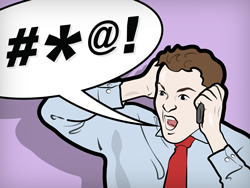In the past, curse words were used after stubbing a toe or during private conversations, but somehow they have slowly started to make their way into pop culture. Now you can find curse words in almost every song, in television show titles, book titles, and even in a few company names. The question is, have curse words become so popular that they have lost their shock value?
Younger generations are starting to use curse words in the ir everyday vocabularies. Everyone these days uses a very “colorful” language, no matter where they are. They could be in school, on the bus, in the car, with their friends, even at home, it doesn’t matter anymore. We use profane words everywhere and the younger generation is starting to pick up on this, making curse words lose their meaning. If we hear these words every day, there is no more surprise to them.
Lauren DeSantis, a senior studying business management, said, “I feel like curse words have become too common because of the way our younger generations are growing up. They’re common in the media, like movies, video games and music, things we are familiar with on a daily basis.”
DeSantis continued, “In the household, curse words have become a part of our daily language. The other night, while I was babysitting, my seven-year-old cousin dropped the ‘F-bomb,’ and when I asked her where she heard it from, she said ‘mommy.’”
In an article posted on TIME.com, it was reported that Melissa Mohr, a medieval literature expert, found that about 0.7% of words a person uses in the course of a day are swear words. That number may not sound like a lot, but it’s actually about the same rate that people typically use first-person plural pronouns – words like “us,” “our,” and “ourselves.”
Timothy Jay, a psychology professor at the Massachusetts College of Liberal Arts, also found that there has been a rise in the use of swear words by children, as well. By the age of two, most children know at least one curse word.
One of the biggest problems is that curse words are always around us. Psychology Professor Natalie Ciarocco explained, “I am not sure if people are using curse words more, but with increased popularity of shows on premium cable channels, I think we are exposed to them more in the entertainment industry.”
There was a time when the “F-bomb” and the word “A-hole” were not used in everyday language. There was a time where the words that degraded women were not used on a daily basis, but in today’s society, you hear these words everyday.
Calling someone an “A-hole” or saying “F you” does not mean the same thing it did a few years ago. Now, it is just a part of today’s society. There is no more shock when you hear these things. “Our increased exposure desensitizes us to it [cursing],” added Ciarocco.
Brianna Graham, a junior studying communication, said, “I really do believe curse words became a huge part of everyday language. Some words I feel are offensive, but others my family truthfully use on an everyday basis. My mom, sister and I curse around each other all the time.”
It is almost as if it has become a habit, and a very bad one that, almost like smoking or biting your fingernails. People curse without even realizing they are doing it. What makes it worse is the fact that nobody cares. People get away with cursing in front of their parents, grandparents, and even their bosses. No one ever says, “watch your language” anymore.
Today’s typical profanities have become “trendy.” People can playfully call women out by using words that, 10 years ago, were offensive and unheard of. We use foul language as slang, which not only just expresses anger anymore, but also expresses humor. If someone uses the word “hell,” no one gasps in shock anymore, they either laugh or do not react at all.
If someone uses the “F-word” to get someone mad, it does the complete opposite. Calling someone an “a-hole” is not offensive anymore, it is just another word people use either jokingly or to try and get someone mad. Curse words have completely lost their meaning.
Brianna DeRose, another junior studying communication, feels that there are certain places where curse words should not be used. “I think curse words have become a part of everyday language. I believe there is a time and place where you shouldn’t use curse words, such as religious or professional events.”
DeRose added, “I also believe in public places certain words shouldn’t be said since younger people can be around. I think around friends or family it is okay. They are just words and if someone truly knew you, they should know when you curse, it’s not in a bad way.”
The point is that if a word is overused, its meaning changes. If something is being used on a day-to-day basis, it becomes common. There is no more shock value to the use of profanities if they are being used in everyday language; curse words are becoming more of a simple interjection or an adjective rather than words that are hurtful or are used to get someone’s attention.
IMAGE TAKEN from businessinsider.com




